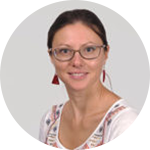-
A simple diagnosis
-
Aortic tears are rare, but can often prove fatal. At the Institute of Clinical Chemistry, Joanna Gawinecka is developing a blood test to simplify the diagnosis. The test could save lives and help prevent the condition.
-
 «I’m happy to be alive
«I’m happy to be alive
and am enjoying every second of my life.»Klaus Bolliger* was lucky. The tear in his aorta was diagnosed using a CT scan at the last minute. Blood was already flowing from his aorta into the surrounding tissue. An emergency operation saved his life – the affected part of the artery was replaced by a synthetic prosthesis.
An aortic tear – technically known as acute aortic dissection – is rare, but can often prove fatal. High blood pressure is a particular risk factor, and men and older people are also more frequently affected.
A quick diagnosis is crucial. This isn’t easy, as the symptoms – sudden pain in the chest and back – are similar to those of a heart attack. Today, doctors attempt to make the correct diagnosis using ultrasound, CT and MRI scans.
But this would be far easier with a blood test. At the University Hospital Zurich’s Institute of Clinical Chemistry, Joanna Gawinecka and her team are trying to develop just such a test. They are looking for so-called biomarkers in the blood that could indicate an imminent or existing aortic tear.
The researchers have already identified 12 proteins as potential biomarkers and are now analyzing them in more detail in clinical trials. The study has been made possible thanks in part to a donation to the University Hospital Zurich Foundation from entrepreneur Hans-Peter Wild.
Gawinecka is confident that they will succeed in developing a test that can reliably differentiate between an aortic tear and issues such as a heart attack. The new blood test could prove to be a lifesaver for patients with acute aortic tears, particularly in medical practices without imaging facilities. The test would also make it easier to examine and treat people with certain preexisting aortic conditions.
* anonymized
-
100% financed

-
-
Project management
-
-

Joanna Gawinecka, PhD
Senior Research Associate, Institute of Clinical Chemistry
University Hospital Zurich
-

Prof. Dr. Arnold von Eckardstein
Director, Institute of Clinical Chemistry
University Hospital Zurich
-

Prof. Dr. Manfred Claassen
Professor of Computational Biology
Institute of Molecular Systems Biology, ETH Zurich
-
-
Supporting partner
-
-
Dr. Hans-Peter Wild
